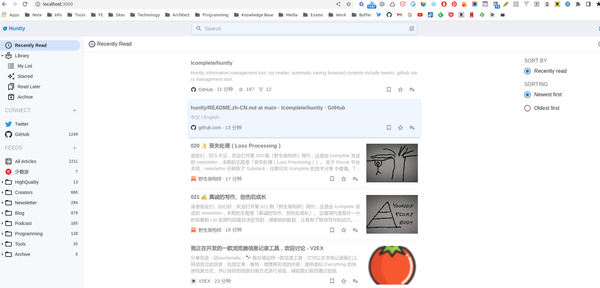GNUHealth, open source hospital information system (HIS) is gaining more ground

GNU Health is a free open source hospital information management system (HIS), It was built on the GNU foundation, as it also brands Dr. René Favaloro quote:
"La medicina sin humanismo médico no merece ser ejercida"
which translate to " Medicine without medical humanism does not deserve to be exercised.", GnuHealth aims to save a huge sum of money on healthcare practice by their enterprise-grade healthcare management solution.
GnuHealth was originally developed by Dr. Luis Falcon, MD, a physician and a computer scientist also an open source activist. He is the founder of GNU Solidario the main host of GNUHealth with a primary focus on healthcare and education.
GNUHealth now is the core host of many other healthcare projects including Occhiolino ( GnuLIMS ) a Laboratory information management system, GNU Health embedded a RaspberryPi ready GnuHealth setup built, and Thalamus a headless RESTful API hub for GnuHealth.
One of the most interesting features about GnuHealth it's easy to install as it's already begin added to many Linux distributions repositories, so it can be installed directly from the software center, and it has desktop clients packed in installable packages for Windows and Mac OSX.
GnuHealth does not function as HIS only, It can work as simple one node electronic medical record EMR system, so it can work in small clinics as hospitals.
Many open source healthcare projects lose their steam in time, and die or abandoned by their developers, GnuHealth is backed by GNU Solidario: a Non-profit Non-government-Organization (NGO) built to support it and other projects they already launched.
GNU Health was based on Tryton, an open source enterprise-grade ERP system built for business. GNU Health extends Tryton and utilizes it for hospital's use with health-care ready modules including complete clinical workflow, Patient records management, Laboratory management, Medical stock management and more.
GNU Health primary features

- Primary healthcare and Family medicine clinical-flow
- Medication management
- Diseases and Medical procedures standards (ICD-10 / ICD-10-PCS)
- Patient Genetic and Hereditary risks: Over 4200 genes related to diseases (NCBI / Genecards)
- Epidemiological and other statistical reports
- Doctor administration
- Lab management
- Stock management
- Hospital Financial Administration
What makes GnuHealth special?
- Built by a physician and based on a well-described clinical model
- Cross-platform
- Built on enterprise-grade open source business environment
- Complete paperless work-flow
- Desktop clients
- Multiple deployment options
- Easy to deploy, manage and use
- GNU Health embedded with RaspberryPi
- Multi-lingual support
- Well developed data-structure
GNU Health speaks languages.
GNU Health has been translated into many languages, and that makes it ready to use in many countries and limits the time of translation/ localization as well as staff training. Some of the translated languages are used by many countries as French, Spanish, English, Russian and Arabic.
GNU LIMS/ Occhiolino : Laboratory Information system
GNU Solidario teams have released a GNU LIMS, a laboratory information management system, which follows the same concept of GNU Health. Aiming to provide a complete laboratory work-flow for healthcare.
Documentation
With every release, GNU Health team release a new edition of GNU Health WikiBook, which includes an end-user manual, developers documentation, and instructions on how to deploy, install and run GNU Health.
The WikiBook contains detailed documentation about every module, testing environment, plugins setup and development, a glossary for GNU Health terms, and FAQs section.
The book also has a dedicated page for the active mailing list for GNU Health in different languages.
RaspberryPi ready Hospital Information System

GNU Health embedded project utilizes RaspberryPi ( what is it ) to create a fully ready to use the EMR system, which can be used without the need of a network.
What's the best Linux distro for GNU Health?
GNU Health works great on many Linux distributions, like Debian, Ubuntu, RedHat, and OpenSUSE. However, OpenSUSE has the most powerful support yet for GNU Health, it has dedicated detailed documentation page in its an official wiki for GNU Health. It was chosen as we mentioned before to be the core for GNU Health embedded system with RaspberryPi.
How to test and try GNU Health
There is a complete section about testing GNU Health, in the documentation, Many options are included, with a demo database that will make easier to use with actual-alike demo data. However, It's easy to install and use on Linux. For Mac OSX or Windows, you may try Tryton desktop clients and connect to the demo databases.
Though, some may consider it slow, especially with the remote demo database, either for Tryton or GNU Health, but, it's up to the location of the database as your local setup and configuration will result in faster results. The user-interface loading behavior and how it loads the assets may be a major issue for users who get used to fancy desktop or web clients, but it does not conflict with the usability or the functionality of the system also it speeds up with the local network setup.
GNU Health new grounds.
GNU Health has gained new grounds in several countries in the past few years, and recently it was installed and used in Haiti , and Cameroon.
#GNUHealth lands in #Haiti ! Very excited to start cooperation with the local team!! 😻 https://t.co/7BPYWtOsuz #Freedom #PublicHealth #SocialMedicine #LibreSoftware @fsf pic.twitter.com/XTNDXTFKVw
— GNU Health (@gnuhealth) February 1, 2019
The fact that GNU health is successfully implemented in many countries and different healthcare settings/ setup makes it an actual asset for transforming the healthcare services and improving the clinical-flow in those environments, which eventually may lead to improving the quality of the service.
GNU Health is built to provide free open-source solutions, however, it requires supporting If you are interested in supporting GNU Health effort and activities, we would recommend having a look at their projects and activities and consider supporting them through their page and spreading the word of their great effort.
- Top 10 Open source & free HIS( Hospital Information systems) and EHR solutions
- 20+ Open source EMR/ EHR



